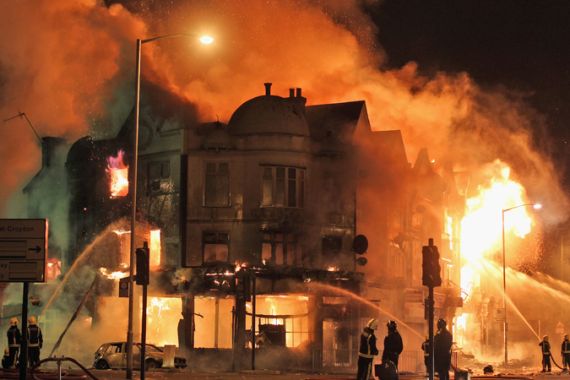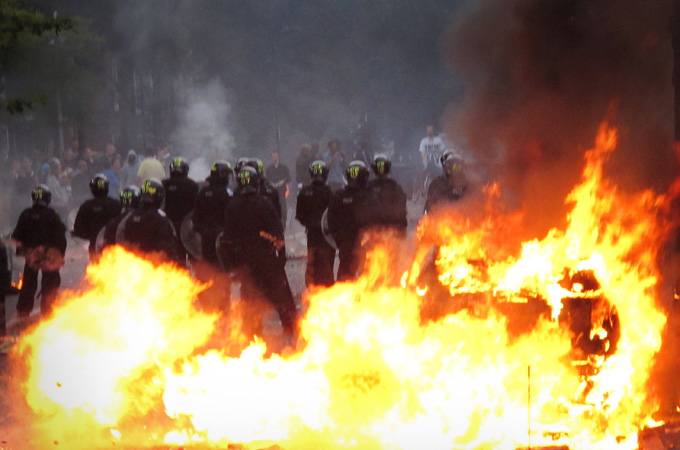UK press reaction: ‘Rioting-meets-shopping’
British newspapers united in condemnation of ‘orgy of violence’ with special ridicule reserved for greedy looters.

 |
| Police in riot gear stand near a burning car in Hackney, east London, on Monday (Getty Images) |
British newspapers have responded to three nights of looting, arson and rage with scathing editorial broadsides aimed at the perpetrators and the forces alleged to have fostered them.
Those who torched homes, assaulted police and mashed-up shops in at least five cities were blasted by the press for sparking anarchy the Guardian called “an outburst of resentment and a mark of manifold failure” of government policies.
The Tuesday edition of The Sun put forth more colourful descriptions of events; one headline read “Descent into Hell” another “Flames of Hate”. Yet another headline described the rioters as “street jackals” and “feral riot yobs”, using the London slang term for thug.
A Daily Telegraph editorial called for action: “All politicians need to speak out robustly against these criminal elements who have been tolerated for far too long … The police must crack down hard on this outbreak of summer lawlessness. In doing so, they will have the support of all decent people.”
Other editorial lines were equally firm, reserving a special disregard for the motivations behind what the Daily Mirror called three days of “Yob Rule”.
Paul Vallely, a columnist for The Independent, said the riots were characterised by “wanton consumerism” and cited examples of looters trying on clothes for size in the middle of the carnage.
Vallely wrote: “This is rioting-meets-shopping. It does not, as one eyewitness put it, feel like an ‘appeal from the heart of the ghetto’ so much as an opportunity ‘to get a nice new pair of trainers’. Not so much desperate as decadent.”
The violence was denounced in unison by the press corps, even if the reasons behind it fell along partisan lines.
Cameron ‘out of touch’
Tim Shipman of The Daily Mail wrote: “Left-wing politicians have cynically sought to make political capital out of the riots, blaming government cuts for the orgy of violence … Labour MPs and activists lined up to make excuses for the thugs, spouting claims that disadvantaged youth had no option but to smash up high streets.”
But the rival Daily Mirror on Monday placed blame at the prime minister’s office.
“David Cameron’s government isn’t directly to blame for the orgy of violence but he is badly out of touch with the country he’s supposed to lead … Smouldering Tottenham, and an economy tottering on the brink of an abyss, emphasise Britain’s yearning for a prime minster with a sure touch … Sadly, we’re saddled with a Prime Spinner who prefers to smirk for the cameras.”
Such ominous forebodings about unspecified societal collapse were common.
Mary Riddell, a columnist for the Daily Telegraph, wrote of “juvenile wrecking crews on the city streets” and claims a “‘lost generation’is mustering for war”.
Riddell wrote: “London’s riots are not the Tupperware troubles of Greece or Spain, where the middle classes lash out against their day of reckoning. They are the proof that a section of young Britain – the stabbers, shooters, looters, chancers and their frightened acolytes – has fallen off the cliff-edge of a crumbling nation.”
Camila Batmanghelidjh, in a column in the Independent, added her voice to those who blamed social problems and government failures, in part, for the riots.
“How, we ask, could they attack their own community with such disregard? But the young people would reply ‘easily’, because they feel they don’t actually belong to the community. Community, they would say, has nothing to offer them,” Batmanghelidjh wrote.
Others, notably Richard Littlejohn of the Daily Mail, dismissed the role of socio-economic factors.
He wrote: “One thing is certain: this wasn’t about poverty, not in the material sense. If there’s poverty, it’s spiritual poverty, moral poverty and poverty of ambition … In countries where there’s real deprivation, they have food riots. Here we have flat-screen TV riots.”
Littlejohn was one of several commentators who refuted the early comparisons to the UK protests and riots in the 1980s.
“The other certainty is that this has nothing to do with the riots at Broadwater Farm 26 years ago,” he wrote.
“This wasn’t a political protest, or a demonstration against oppression, it was a grotesque manifestation of our shallow, instant gratification, I-want-it-and-I-want-it-now consumerist society, coupled with an extreme explosion of the kind of casual violence which scars our town and city centres across Britain every weekend.”